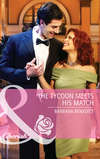Kitabı oku: «A Spanish Honeymoon», sayfa 2
Liz leaned on the rose marble worktop that divided the working part of the kitchen from the dining area. ‘The kitchen and the bathrooms need more attention than the other rooms. I have no idea how efficiently Alicia cleans when she does clean. The most sensible plan might be for me to look in, say, every two weeks and suggest to her what needs doing.’
He gave her a smiling glance. ‘I notice you say “suggest” not “tell”. That sounds as if you have good management skills.’
Conscious of his charm, and resistant to it, she said, ‘Most people prefer to be asked rather than ordered. That’s just common-sense. For what you’re prepared to pay me, I’m prepared to make sure that the house is always ready for occupation. Though, obviously, some notice of your arrival is important as far as stocking the fridge is concerned.’
‘Give me your e-mail address and I’ll give you mine,’ he said. ‘That way we can keep in touch easily. You’ll find a notepad and pencils by the phone in the other room—’ with a gesture towards the living room.
Liz fetched the pad and wrote her address for him. While waiting for the kettle to boil, he wrote down his for her. Then he spooned coffee powder from a jar of instant decaff into the cups, filled them with water and carried the tray to the table.
‘I didn’t buy Alicia’s explanation of why the place was in a mess when we arrived,’ he said. ‘Hopefully, with you keeping an eye on her, she’ll pull her socks up. If she doesn’t, it may be necessary to find someone else. Perhaps you could make enquiries. I know a lot of the younger women have cars now and prefer to work in supermarkets and offices. But for the older women, without any transport, domestic work is still the only option.’
‘I’ll keep my ear to the ground,’ said Liz. ‘But it has to be said that cleaning an empty house for an absent employee is not much fun. Alicia may buck up a lot if you’re going to be here more often, and if I’m around to applaud her efforts. Housework is horribly repetitive and women who do it need to feel appreciated.’ She was thinking of her mother, whose excellent housekeeping had never been praised or even noticed.
He changed the subject. ‘Do you mix with the other foreigners round here? Have they been friendly?’
‘Very friendly…and so have the local people.’ But, as she had already learned in England, there was a world of difference between the life of a wife and that of a widow. The social world was set up for pairs, not singles.
The door to the terrace opened and Fiona joined them. She was wearing the briefest possible silver two-piece swimsuit. As Fielding rose, she said, ‘Is that coffee? Can I have some?’ Only as an afterthought did she toss a ‘hello’ at Liz.
For something to say, Liz asked, ‘Did you enjoy your night on the town?’
‘It was OK.’
Fiona’s indolent shrug made her breasts do a jelly-like wobble in their silver cups. Probably most men would find her nudity enormously sexy, Liz thought. But would a discriminating man? Wouldn’t he think she was overplaying her seductiveness. Still, presumably sex, and lots of it, was the only reason she was here. She didn’t give the impression of being a great conversationalist. She was not even good at the small talk that strangers tossed back and forth in situations like this.
Liz drained her cup. ‘I’d better be off. I have a lot to do today.’
‘Hang on a minute.’ Fielding handed Fiona her coffee, then felt in his back packet and produced a billfold. ‘You’d better have some money on account…both to pay Alicia and for yourself.’
‘That really isn’t necessary. We can settle up next time you’re here.’
‘Certainly it’s necessary. I might get my head blown off by a terrorist and then where would you be?’ He handed her some twenty mil bills. ‘Tomorrow morning I’ll call at the bank and arrange for the payments into your account to be altered. You also need the extra house keys I had cut. They’re in a drawer in the hall.’
Following him from the kitchen, Liz said, ‘Goodbye, Fiona.’
Fiona did say, ‘Bye,’ but she didn’t bother to mask her indifference with a smile.
She must be fantastic in bed for him to put up with her abysmal manners, thought Liz, as she marched down the street, the money in her pocket, the keys to La Higuera in her hand.
When Cam returned to the kitchen, Fiona said, ‘She ought to get that nose bobbed.’
‘What’s wrong with her nose?’
‘It’s too big.’
‘So is mine,’ he said, rubbing the prominent bridge inherited from his great-grandfather, Captain ‘Hawk’ Fielding. His features had been similar to those of the Afghan tribesmen against whom he had played the Great Game on the North West Frontier, eventually dying a hero’s death in Kabul in the early years of Queen Victoria’s reign. Cam had often thought it was probably a gene from his adventurous forebear that had dictated his own choice of career.
‘That’s different,’ said Fiona. ‘On a man a big nose is OK. On a woman it’s not.’
‘I only noticed her eyes. They’re the colour of speedwells.’ Realising that Fiona might never have seen a speedwell, he added, ‘They’re small wild flowers…the bluest of blues.’
‘She doesn’t like you,’ said Fiona. ‘Or me. She was looking down her big nose at both of us. But it didn’t stop her taking your money.’
‘Why do you think she doesn’t like us?’ Cam could guess why, but he doubted if Fiona could.
‘I expect she envies you,’ said Fiona. ‘You’re famous and rich and successful, and she’s a nobody living in a grotty little house with no money. I shouldn’t think she’ll ever get another husband.’
‘You’re a luscious piece, but you don’t have a kind heart, do you, Fifi?’ he said dryly. ‘My reading of Mrs Harris is that she likes her little house, she doesn’t want to shop till she drops, and she’s still in mourning.’
Fiona didn’t like it when he called her Fifi. There were several things about him she didn’t like. He could be sarcastic, and sometimes she had no idea what he was talking about. But she enjoyed being envied by other women who would like to be his girlfriend, and he didn’t expect her to do all the work in bed, like some of the men she had known. In fact going to bed with him was a treat. She was in the mood for it now.
She gave him her most alluring smile. ‘I’m going to have a shower. Care to join me?’
In the night, without waking Fiona, Cam got up and went downstairs for some water. In his twenties and early thirties he had got through a lot of alcohol, but nowadays he drank less and less, knowing what happened to journalists who went on hitting the booze into their forties.
He was fit, and he wanted to keep it that way. He had drunk more this week, with Fiona, than he had for a long time. And he knew why. Because she bored him. When they weren’t actually in the sack, he found her a dull companion. It had been a mistake to bring her. This wasn’t her kind of place. She liked shopping and smart restaurants and places to dance. It had been selfish of him to deprive her of the things she enjoyed. She was a playgirl, but he was no longer a playboy. It was time to recognise that fact, to restructure his life accordingly.
After drinking one glass of spring water, he carried another upstairs. The bedroom was full of moonlight. It illumined Fiona’s unconscious face and the voluptuous curves outlined by the rumpled sheet.
Cam went to the window and looked out. Beyond the top of his garden wall was a row of Roman-tiled roofs, many tiles out of alignment, others speckled with lichen. Several of the houses were empty or used only for storage. There was only one flat roof, a conversion done by Beatrice Maybury.
Thinking about her successor, the buttoned-up Mrs Harris, he felt he had made a good move in appointing her to sort out his domestic problems. She seemed the conscientious type who would earn every peseta of the extra money he was paying her. She was certainly doing a much better job with the garden than Beatrice had.
At the same time he thought she was crazy to bury herself in a place like Valdecarrasca. Obviously, as he had said to Fiona, Liz Harris was still in mourning for her damned fool of a husband who had thrown away his life, and ruined hers, in a gallant act of madness. If his attempt had succeeded, he would have been a hero. Instead of which he was dead and she was condemned to a lonely future. He hadn’t asked, but he felt sure there were no children. If there were, she wouldn’t be here.
That she had accepted his offer, while privately disapproving of him, suggested that her work as a designer wasn’t bringing in enough money. Not that she had shown her disapproval, but his job had made him an expert at picking up vibes. Like most ‘good’ women, she had a strict moral code that put free agents like himself and Fiona beyond the pale. Good women wanted everyone to live the way they did, the men in solid nine-to-five jobs like accountancy and the law.
But he had chosen a career that demanded he pack his bags at short notice and go to wherever the headlines were being made, usually somewhere bloody uncomfortable, from which there was always a chance he might not return. The casualty rate was high among war reporters and photographers. It wasn’t a life to share with a wife and children. Some of his colleagues had tried, but usually it ended in divorce. It was wiser not to attempt it, or not until one retired. Which was what he was thinking of doing.
For almost twenty years he had run the gauntlet of violence in all the world’s worst trouble spots and got through with only a graze from a bullet on his arm. His luck might not hold out much longer. Too many colleagues had died, or been badly injured, or resorted to dangerous forms of Dutch courage. It was time to call it a day and become a desk-bound presenter or, failing that, find some other way of earning his living.
He had a hunch the Internet held the key to his future and, if that hunch proved correct, he could live where he pleased, perhaps here in this peaceful village, so remote from the war zones where he had spent recent years that it might be on another planet.
Early one morning, a week after the persianas came down at La Higuera, Liz opened the Inbox on her e-mail program to find a message from Cameron Fielding. In the subject line, he had typed ‘Congratulations on your website’.
Although the e-mail address she had written down for him was what was known as a dot com address, she was slightly surprised that he had bothered to check that the last part led to a website. But then she remembered he was a journalist, and curiosity was their stock in trade.
She read the main part of the e-mail he had written.
Dear Mrs Harris (or may I call you Liz?)
I’ve been looking round your website. I’m impressed. Maybe you should switch from needlework designs to website design. I’m told there’s a big demand for good site designers. How about making a start by designing a site for me? If you’re willing to have a crack at it, I’ll be happy to pay you the going rate.
Think it over.
Regards, Cam.
Liz printed out his e-mail and put it in her bag to re-read later. Today was the day she drove down to the coast to attend the weekly meeting of the Peñon Computer Club at Calpe.
According to elderly people who had known Spain before the tourist invasion, when she was a little girl Calpe had been a sleepy fishing village. Now it was a large resort with many tall blocks of apartments, most of them holiday flats or the year-round homes of retired expatriates.
Liz didn’t like Calpe but acknowledged that lots of people did, and it took all sorts to make a world. She did enjoy the club meetings, although most of the other members were old enough to be her parents or even grandparents. But their shared enthusiasm for computers made the age difference unimportant. One or two of the old men were inclined to ogle her, and one was a furtive groper. But she could cope with that.
After the meeting, she and Deborah, a divorcee in her late forties who kept in touch with her children by e-mail, had lunch at a Chinese restaurant not far from the port. It was close to the Peñon de Ifach, a massive rock, a thousand feet high, that reared out of the sea and was a mecca for rock climbers from all over Europe.
‘Have you ever walked up the path that goes up the other side of the Peñon?’ she asked her friend.
Deborah shook her head. ‘I don’t have a good head for heights. Living on the higher floors of some of the apartment blocks would worry me!’
‘Me too,’ said Liz. ‘I should feel uneasy sitting out on some of those tiny balconies. But a penthouse apartment with a garden might be nice. The views must be wonderful.’
After lunch she drove back to Valdecarrasca where, having no garage, she had to leave her seven-year-old vehicle in the car park near the building that had once been a lavadero, a public laundry with a stream running through it. Since then the stream had run dry and today, so Beatrice had told her, the water came from deep bore holes near a village at the far end of the valley. Nowadays everyone had mains water and washing machines but, in a country with little rainfall, the ever-increasing demand for water could not be met indefinitely.
After changing out of her good clothes into everyday things, she settled down to reply to Cameron Fielding’s e-mail.
She didn’t mind him calling her Liz, but she wasn’t sure she wanted to call him Cam yet. However, to start ‘Dear Mr Fielding’ sounded rather stuffy in response to his informality, so she stretched a point and started off.
Dear Cam,
I’m glad you like my website and I’m flattered that you’re willing to entrust the design of your site to me. As I have never done any designing for other people, I have no idea what the going rate is. But I can find out, and perhaps we can discuss the matter further next time you come down. I should have to ask you a lot of questions before I could create a site that satisfied us both. What would the purpose of the site be?
Liz.
After she had connected to the Spanish telephone company’s freebie server, and sent the message on its way, she had a spasm of doubt about the wisdom of becoming any more involved with Cam Fielding than she was already.
From the first moment of meeting him, she had been on her guard with him. That being so, was it foolish to take on a commitment that, inevitably, would involve more contact with him? Would it have been more sensible to politely decline his suggestion on the grounds that she had more work than she could handle?
CHAPTER TWO
Entre col y col, lechuga
Variety is the spice of life
UNTIL Cam put the idea into her head, it had not struck Liz that there might be a better income to be made from designing websites than from her present occupation. A site commissioned by a ‘name’ as big as Cameron Fielding would certainly give such a venture a splendid start.
But would there also be a downside? Would designing a site for him involve a lot more personal contact than she wished for?
Cam’s reply to her e-mail came into her Inbox the next time she logged on.
Liz,
In a couple of hours I’ll be flying to the Middle East to cover the latest outbreak of hostilities. Hope to be back next week. Meanwhile I’ll think about the kind of site I want. Maybe I’ll be able to get down to V. for a night or two so that we can put our heads together and get the basics sorted out.
Take care, Cam.
The phrase ‘put our heads together’ conjured up a degree of intimacy that she wasn’t comfortable with. At the same time she was increasingly curious to see him in his public persona.
Beatrice Maybury had not owned a television set. She considered TV a waste of time. Liz had had a set in England but had not brought it to Spain, or bought a new set here. She preferred reading anyway.
She was certainly not going to ask any of the foreigners she knew if she could watch a news programme on the channel Cam worked for. That would immediately trigger more gossip on the lines of— ‘Liz Harris has taken a shine to the heart-throb at La Higuera, we hear. I wonder how long it will take him to get her between the sheets?’ The thought of being the subject of lubricious speculations made Liz cringe.
It was in the middle of another wakeful night that she suddenly realised that his TV channel would have a site on the Web where she might find information about Cameron Fielding, foreign correspondent.
Although her computer was three years old, and not equal to handling the very latest technology, she could pick up the ordinary stuff. She sat up in bed and reached for the quilted dressing gown thrown over the footrail. The days were still mild and warm, but at this time of year there was a significant fall in the temperature after sunset.
With her feet tucked into cosy slippers, she went to her workroom and was soon online. It took only moments to find the website she wanted, and a few moments more to find a list of the channel’s presenters and reporters.
When she clicked on Cam’s name, up came a potted biography and a photograph. The sight of his face looking out at her from the screen had almost the same effect as when she had scrambled to her feet in his garden and looked into those amused grey eyes for the first time.
In an automatic reflex, she right-clicked with the mouse, bringing up a menu that included the option to save the picture to her hard drive. Then, not wanting to, yet compelled to continue, she saved the photograph in her My Documents folder where it would remain until she chose to delete it.
The bio at the side of the picture read:
Cameron Fielding is arguably the best-known of the élite group of internationally famous foreign correspondents who report world news for television. He has been awarded the CBE for his services to journalism.
In a career spanning almost 20 years, Fielding has worked for the BBC, CNN, ITN and Sky News. His reporting has won widespread critical acclaim and many awards including the Amnesty International Press Award, the Reporter of the Year award at the New York Festival of Radio and Television, the James Cameron Award for war reporting, and the One World Broadcasting Trust Award. He has also won the prestigious Emmy Award presented by the American National Academy of Television Arts & Sciences.
Below this was a question-and-answer interview.
Q: Where did you grow up?
A: All over the place. My father’s career involved frequent uprooting. My passport is British, but I was born in Hong Kong and spent my formative years in Tokyo, Rome, Madrid and Washington DC, so I count myself a citizen of the world.
Q: What was your first job?
A: I joined the BBC’s World Affairs Unit after reading Modern History at university.
Q: What was the most memorable event you have reported?
A: I’ve covered a succession of memorable events: Tiananmen Square in 1989; Baghdad and the Gulf War 1991; famine in Somalia 1993; the Soweto riots 1996. Every year produces a major disaster. I wish the media would focus more on mankind’s achievements. I think being swamped with bad news depresses people.
Q: What are your worst and best qualities?
A: Worst: I’m impatient, especially with petty bureaucracy. Best: Probably tolerance.
Q: If you could travel backwards in time, what era would you visit?
A: I’d like to have been the expedition reporter on Christopher Columbus’s ship Santa Maria when, trying to reach the East by sailing westwards, he discovered the New World.
Q: What excites you and what depresses you?
A: I’m excited by the World Wide Web: I believe it has the potential to make life better for everyone. I’m depressed by self-satisfied, self-serving politicians.
As she re-read his answers to the questions, Liz was forced to admit that, had she known nothing about his personal life, the interview would have impressed her.
His childhood sounded far more exciting than hers. She had always longed to travel, but a possessive mother, shortage of money and falling in love with Duncan had conspired to prevent her from being anything but an armchair traveller. Now her wanderlust had diminished. From what she read, mass tourism and the popularity of back-packing had combined to make exotic destinations far less exotic than they had been when she was eighteen. The time to take off and see the world had been then, not now. As her grandmother had often said to her, ‘Opportunity only knocks once’.
Liz shut down her computer and went back to bed. After she had switched out the light, for a while it was Granny she thought about. Granny had tried to dissuade her from marrying so young. ‘You’re not properly grown-up,’ she had said. ‘You’ve had no experience of life…or other men. There are more fish in the sea than Duncan.’
Knowing that her grandmother’s marriage had not been happy, Liz had dismissed her advice.
But her last thought, before she slept, was not about Granny. In her mind’s eye she saw the strong features of the man whose faced was filed on her computer.
Cam’s e-mailed instruction, before his next visit, to have Alicia make up the bed in the room above the garage puzzled Liz until, on her own next visit to La Higuera, she went upstairs for the first time. It then became clear that the bedroom where she had seen him kissing Fiona was a comfortable guest room and the room over the garage was his room.
The first thing that caught her eye was a portrait on the wall between the two windows, obviously placed there so that the light wouldn’t fade it. It was an oil painting of a man in the regimental dress uniform of a bygone age. He had an early Victorian hairstyle, but otherwise it might have been Cam in fancy dress. There was a small engraved brass plaque on the bottom of the ornate gilt frame. She had to go close to read the small writing—Captain Nugent Fielding, 1st Bombay Light Infantry. Clearly the captain was Cam’s ancestor.
There were family photographs around the room and many other personal possessions. She found it interesting that he slept here when he was alone, but used a guest room when he had a girlfriend in residence. What would a psychologist make of that? she wondered. That he didn’t want his private space invaded by any woman? That he saw women purely as sex objects and therefore, like kitchen equipment and garden tools, they belonged in certain areas, but not in here?
It was twelve-forty-five and she was about to wash the fruit she was having for lunch when the telephone rang.
‘Hello?’
‘It’s Cam. I just got in. What are you doing for the next couple of hours?’
‘Nothing in particular, but—’
‘Then we’ll go out to lunch. There’s a lot to discuss. I’ll pick you up in ten minutes, OK?’
Taking her consent for granted, he rang off.
Liz flew upstairs to her room, whipped off her house clothes and scrambled into grey gabardine trousers and a grey and white striped silk shirt. Slotting a belt through the loops on the waistband, she stepped into suede loafers, then put on her favourite gold knot earrings, hurriedly slapped on some make-up and re-brushed her hair before pulling it through a black scrunchy.
It was only when she was ready, with a couple of minutes to spare, that she asked herself, What am I doing, making an effort to look good for a man I don’t even like?
There wasn’t time to consider the answer to that question because, remembering that once summer was past the interior of Spanish restaurants could sometimes be chilly if they didn’t have an open fire, she had to whizz back upstairs and grab her red shawl.
She was running downstairs when she heard a knock on the door. She had thought he would pip his car’s horn to alert her to his arrival, but when she stepped into the street he was waiting to open the door for her. Quickly, Liz locked up and slid into the passenger seat. No doubt it was part of a womaniser’s armoury to have impeccable manners, she thought as he bent to pull the safety belt out of its slot and handed her the buckle.
‘Thank you.’ She tried to recall a previous occasion when a man had performed that small extra courtesy but could not remember it ever happening before.
‘So what’s new in Valdecarrasca?’ he asked, as he got in beside her and pulled the other belt across his own broad chest.
‘Nothing…as far as I know. How did your trip go?’
‘I’ve been dashing around the world, covering outbreaks of mayhem, for too long,’ he said, checking his rearview and wing mirrors before pulling away from the kerb. ‘It no longer gives me a buzz, which means it’s time to call it a day and find something more rewarding to do.’
‘What have you in mind?’
‘It would be fun to do a Gerald Seymour.’
‘The name rings a bell but I can’t place him.’
‘He used to be a war reporter. Now he writes excellent thrillers.’
‘Oh, yes…I remember now. My husband used to like his books.’ Not that Duncan had been a bookworm, but when they were going on holiday he would buy a thriller at the airport and often would still be reading it on the flight home.
‘Unfortunately I don’t think I have Seymour’s imaginative powers,’ said Cam, ‘and, although there are exceptions, not many non-fiction writers make a comfortable living. By the way, the house is in the best shape it’s been in since it was new. Your relationship with Alicia is obviously going well.’
‘My Spanish is improving too,’ said Liz. ‘It’s hard to get her to speak really slowly, but we’re managing. I’ve started buying the Saturday edition of El Mundo. It has very good health and history supplements. It takes me all week to read them, but it’s good for my Spanish vocabulary.’
‘There are some Spanish novels on the shelves in the sitting room. If you want to borrow them, or any of the books, feel free,’ Cam told her.
‘That’s very kind of you. If I do, I’ll take good care of them.’
‘If I had any doubts about that, I wouldn’t have suggested it.’ He took his eyes off the road for a moment to smile at her. ‘I don’t give many people the freedom of my library.’
The flattering implication that they were two of a kind, at least as far as books were concerned, was a small breach in her defences that she couldn’t afford to let him repeat.
‘If there are any wonderful restaurants around here, I haven’t discovered them,’ he went on. ‘But Vista del Coll has a good view and the food is passable. Do you know it?’
‘I’ve passed it. I haven’t eaten there.’
‘The clientele is an odd mix of elderly expats and Spanish workmen. At weekends and on fiestas it’s packed with Spanish families. Young couples are reducing the number of children they have, but the different generations of the family still go out in a bunch in a way you don’t often see in the UK,’ he said. ‘I like that.’
Liz made no comment. That she had no children, and probably never would have, was a sadness she had learned to live with. But sometimes, seeing other women with theirs, she felt an ache inside her.
It was only a short drive to the restaurant where, although it was early for lunch by Spanish standards, there were already several cars parked.
‘Would you prefer to eat inside or outside?’ Cam asked, as they mounted the steps to the terrace.
‘It’s such a lovely day, it seems a pity not to make the most of it.’ Liz had left her shawl on the back seat of the car.
‘That’s my feeling too. How about there?’ He indicated a table for four where they would both be able to sit facing the mountains.
Cam was drawing out a chair for her when the proprietor bustled out to greet them. Evidently he remembered Cam from previous visits and the two men—one short and rotund, the other tall and lean—had a conversation in rapid Spanish.
Then the other man gave a smiling bow to Liz and presented her with one of the two menus he was carrying.
‘What about a drink while we’re choosing what to eat?’ Cam said. ‘A glass of vino blanco, perhaps?’
‘I’d rather have a glass of sparkling water.’ She wanted to keep a clear head.
Cam’s left eyebrow rose a fraction, but he didn’t try to persuade her to change her mind.
The menu, she discovered, was set out in several languages. She read the Spanish page, keeping her finger in the English page in case there were dishes she could not translate.
With her bottle of spring water came a glass of white wine for Cam, a basket of crusty bread and a dish of alioli to spread on the bread.
‘When I was in my teens, alioli was always made on the premises,’ he told her. ‘But then an increase in salmonella caused several bad cases of food-poisoning and restaurant hygiene regulations became a lot stricter. Now it’s not homemade any more and doesn’t have the same flavour.’
Liz sipped the refrigerated water and looked at the view. There was no denying that it was nicer being here, sitting in the sun with an interesting companion, than having lunch by herself at home.
‘Were your father and grandfather journalists?’ she asked, remembering what he had told her before, and what she had read about him online.
The question seemed to amuse him. ‘Definitely not, and they didn’t approve of my choice of career. They wanted me to follow them into the foreign service but fate decreed otherwise. Do you believe in fate?’
‘I don’t know. Do you?’
‘No, actually I believe in chance. The chance that led me to break the family tradition happened in Addis Ababa…if you know where that is?’
‘Of course…it’s the capital of Ethiopia in north east Africa.’
‘Your geography is above average. You’d be surprised by how many people I meet who have only the haziest idea where places are outside their own country. It happened during a vacation while I was at college. I was in Ethiopia when a munitions dump blew up, killing a TV reporter and leaving the cameraman and sound recordist without a front man. I persuaded them to let me stand in for the guy who was dead. I had beginner’s luck. The reports we did were good enough to get me a place on the payroll as soon as I got my degree. How did you get your start?’
Ücretsiz ön izlemeyi tamamladınız.
















